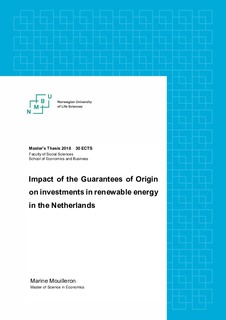| dc.description.abstract | The shift of energy production from fossil fuel to renewable energy is a central point to reduce the greenhouse gases emissions and reach the 2°C target under the COP21 Paris Agreement. The development of renewable energy is hampered by the low generation price of electricity from fossil fuel. To counter this lack of competitive price of renewable energy, the European Union has implemented measures to bolster renewable energy production and use. Measures have rather been focusing on dynamizing renewable electricity production than dynamizing electricity consumption. Guarantees of Origin, defined in European Directive 2009/28/EC, is an instrument allowing renewable electricity producers to certify to their customers that their electricity comes from renewable sources. This paper examines the impact of these Guarantees of Origin in the future investment in renewable electricity technologies. I constructed a model based on linear programming, applied to the electricity production in the Netherlands. The objective function is minimizing the cost of national electricity supply (including import), under the electricity demand constraint and maximum generation capacity constraint. This model is tested in different scenarios. A scenario with no involvement of the Dutch government in the minimum or maximum electricity generation from sources, and a scenario with limits imposed by the government on the minimum or maximum electricity generation from some sources. These scenarios are also tested with and without the presence of Guarantees of Origin. We will consider that the price of Guarantees of Origin is 10€/MWh.
The results show that with or without a government involvement, Guarantees of Origin allow a shift in the electricity production to renewable electricity faster than without. In the short term, the impact of Guarantees of Origin on renewable is higher than in the long term. Indeed, in the long term, the electricity generation price from renewable sources is expected to decrease by itself due to gain in efficiency and learning effect. Simultaneously, the electricity generation price from non-renewable sources will likely increase due to an increase in the fuel price. Thus, the impact of Guarantees of Origin attenuated as the price of renewable technologies become competitive. In the short term, Guarantees of Origin allow the production of electricity from some renewable sources that would not have been profitable without the financial benefit generated by the Guarantees of Origin.
The results also show that Guarantees of Origin have more impact on the share of renewable electricity generation when there is no government involvement than when the government imposes limits on some electricity sources. The share of renewable electricity is smaller in the case of government involvement as restrictions on biomass are imposed. However, the coal used in the case of no government involvement is totally replaced by natural gas. Thus, the total emission intensity from the electricity sector is smaller in the case of a government involvement. | nb_NO |

